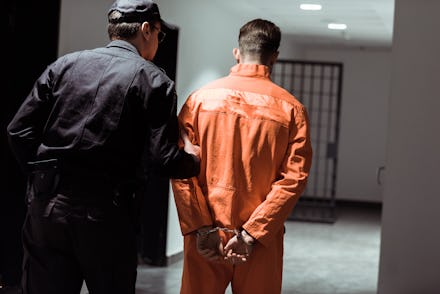The federal government will lock all inmates in their cells for 14 days to combat coronavirus

Social distancing is already isolating enough, especially if you live alone. But imagine not even being able to access the internet or a phone to check up on loved ones or have the ability to look — let alone walk — outside. That's now the case for federal inmates who must spend the next 14 days in their cells.
When it comes to coronavirus, incarcerated people are especially vulnerable. As illustrated by COVID-19 Behind Bars, an independent journalism project launched by Adryan Corcione, it's hard to find a state without at least one jail facility impacted by the pandemic.
On Tuesday, the Federal Bureau of Prisons (BOP) announced its solution in a press release: All inmates will be kept in their cells. Yes, everyone. Under the policy, which takes effect Wednesday, the BOP said that incarcerated people should still have access to regular programs and services, such as mental health treatment and education, "to the extent practicable." The BOP's said its response follows a "growing number of quarantine and isolation cases in our facilities."
The main issue with the BOP's plan is that it's been done before. You may have heard it billed under a different name: "solitary confinement." Although the BOP did not use that language within its press release, Ed Chung, the vice president of criminal justice reform at the Center for American Progress, quickly pointed out that the new policy is "essentially" mandating mass solitary confinement across all BOP facilities by locking inmates in their cells almost all of the time.
There are a number of reasons why people in prisons, jails, and other detention facilities are so vulnerable right now. To start, there are often large numbers of people housed in close quarters, and they may not have access to safe water or soap. In many facilities, hand sanitizer is considered contraband because it contains alcohol.
Forcing people into their cells isn't the solution, though — especially when it doesn't seem like BOP is being honest about the extent of its problem. Coronavirus is already spreading through BOP facilities, resulting in the death of one inmate in Louisiana. But rather than trying to test and treat incarcerated people, Eric Morris, a maintenance worker at a federal prison, told Vice that the GOP isn't testing symptomatic people unless they require hospitalization.
“The Bureau is playing with these numbers,” Morris said. “Because if they don’t test ‘em and they don't get confirmed, they don’t have to be reported, which in turn is skewing the numbers nationally.”
If you are not appropriately testing people within a facility, then you have no way to know just where the virus has been. In addition, incarcerated people didn't bring coronavirus inside themselves. Correctional officers and other officials can be carriers of the virus, and they're the ones most introduce it into the facility because they go home to the outside world every night.
Locking people into their cells doesn't guarantee them access to testing, a doctor, or the proper supplies to practice basic hygiene. Instead, it amounts to a form of torture, with the United Nations's Mandela Rules saying that solitary confinement shouldn't be used at all with those who have mental or physical disability or illness. Incarcerated people are almost three times more likely to report having a disability compared to the non-incarcerated population.
The BOP has other options. Over 400 former U.S. attorneys, federal judges, and others have called on the government to at least release vulnerable individuals from federal custody; some cities have already taken to releasing nonviolent offenders. The solution to coronavirus cannot be simply falling back on a practice that is already known to cause significant damage to incarcerated people's mental and physical health.